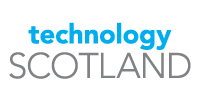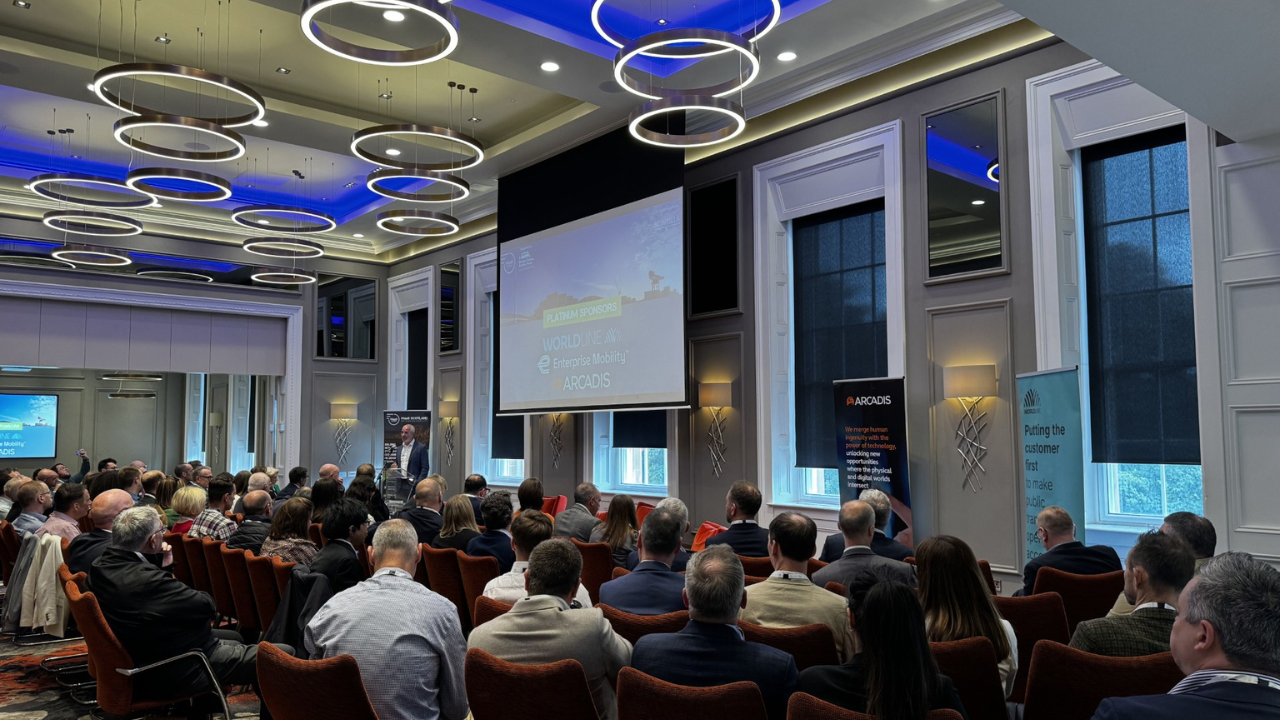
Background
The highlight of our MaaS Scotland calendar, the MaaS Scotland Annual Conference and Dinner, returned on Thursday the 6th of June. For the first time ever, Glasgow staged the event, a fortunate change of venue given that quarter of a million ‘Swifties’ were descending on Edinburgh at the time!
The event, hosted in the fantastic Clayton Hotel, brought together over 100 senior representatives from across our mobility community, including local authorities, transport authorities, operators, technology providers and consultants.
This year’s conference was also an opportunity to officially launch activity towards the creation of a MaaS Roadmap for Scotland, a project led by MaaS Scotland with support from Smarter Choices, Smarter Places. With this in mind, the event was designed to provide a forum for honest exploration of where MaaS currently sits across the UK, and to be a practical and pragmatic discussion as to how we plan to progress MaaS to meet the ambitions we all share. In short, the event was tasked with addressing the question head on – is MaaS Dead? The answer, of course….not a chance!
Keynote Speakers
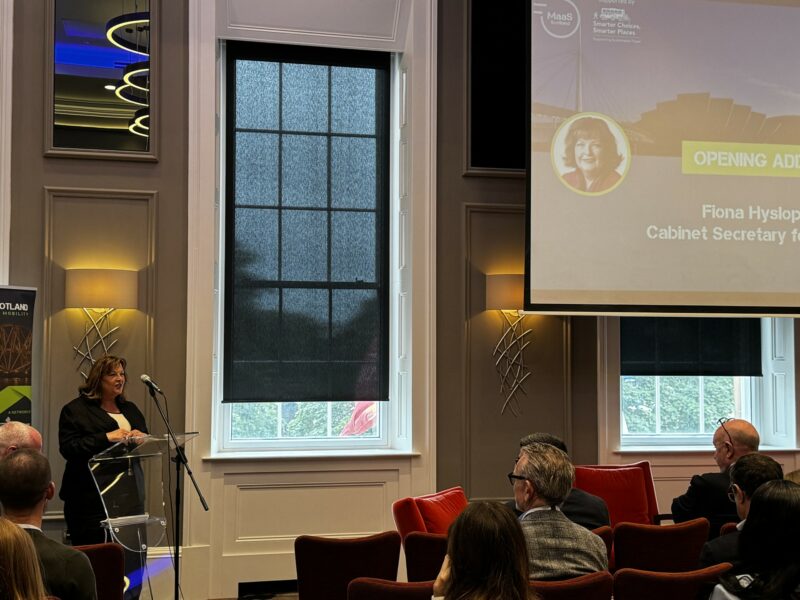
The event began with a welcome address from Fiona Hyslop, MSP, Cabinet Secretary for Transport. As well as setting out a number of measures (current and future) identified by Government to meet the priority ambitions of NTS2, the Cabinet Secretary highlighted the role of MaaS in supporting these measures. While the outcome of the MIF evaluation will be crucial in understanding this more clearly, it was welcome political support for the potential MaaS offers.
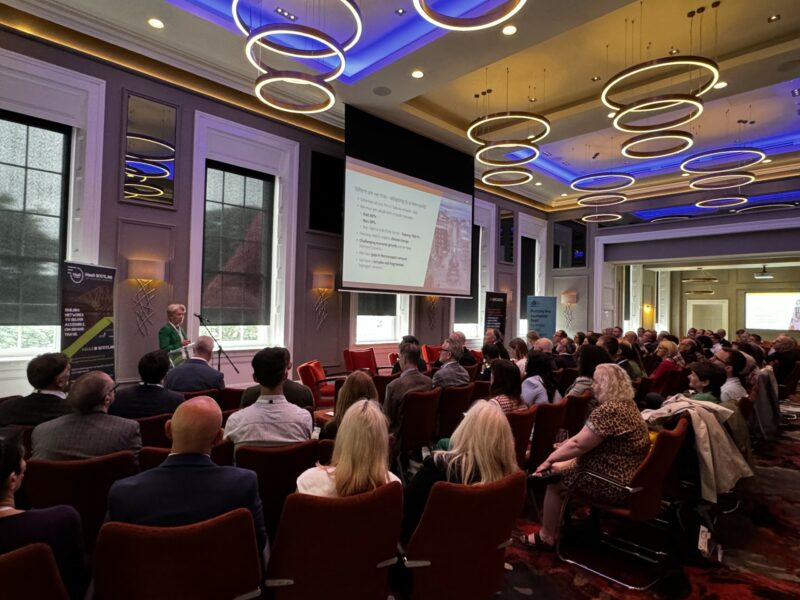
Our first keynote presentation was delivered by Valerie Davidson, CEO at SPT. Valerie provided an excellent overview of the current challenges within the SPT region and introduced the role of the Regional Transport Strategy in addressing these. Valerie also highlighted the specific policy recommendation within the RTS to ‘Develop and facilitate Mobility as a Service within the region, building upon existing opportunities including Zonecard where appropriate’. While encouraging, Valerie also emphasised that early research showed the current transport network within the SPT region remains too fragmented to implement MaaS straight away. A ‘state of MaaS readiness’ was proposed to build more capabilities for a more sophisticated MaaS system.
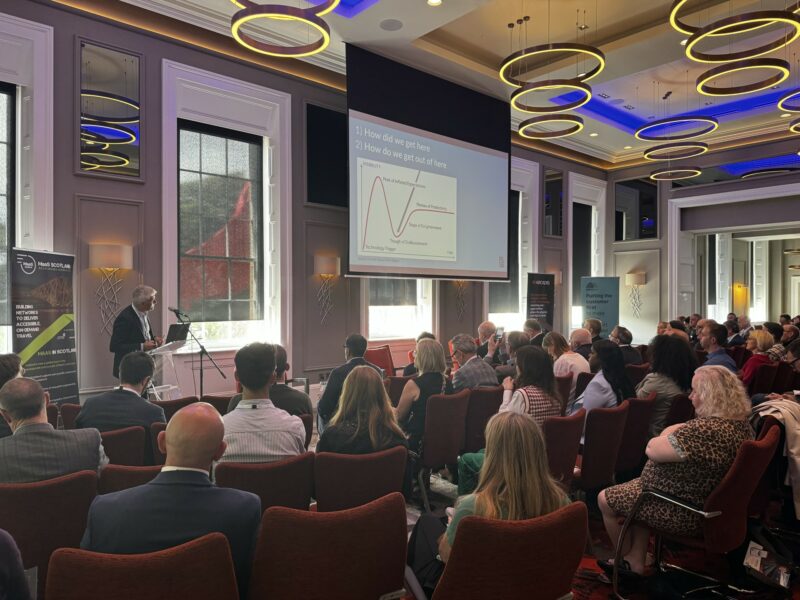
The second keynote was delivered by Hans Arby, Senior Researcher at the RISE Institute in Gothenburg and previously the founder of one of the world’s first MaaS platforms, Ubigo. Hans addressed the issue of hype around MaaS, particularly in the early stages, proposing that MaaS was now at the bottom of the hype curve but in a position to progress upwards. He highlighted early issues with MaaS deployment, in particular a lack of understanding as to what the user/businesses actually wanted. A theme that was to emerge throughout the conference. Other issues around operator aggregation, arguments over who should lead, and short-term funding for pilots added to the early problems for MaaS. Expectations were perhaps too high, too quickly and MaaS must be given more time to find its best way forward, acknowledging that it is a complicated business with multiple delivery models available. More and more MaaS implementations are coming on stream and more and more good platforms are emerging. We may be at the bottom of the curve, but we can learn from what has gone before and we are set well for the future.



Panel sessions
Throughout the day, three panel sessions brought together some of the leading minds in UK and European MaaS to address some of the key challenges faced currently and plot a strategic path in future. While the panel sessions tackled the challenge of MaaS from different angles, some common themes emerged:
- We must put the user in the centre – throughout the day there was a key theme around user engagement, in particular the need to build MaaS implementations around what the user actually wants and needs. This includes challenges around accessibility. This must be core to all future MaaS projects and budget must be allocated to do this properly and effectively. Ultimately, if a user base cannot be built, then MaaS will not succeed.
- Vision and leadership are crucial – MaaS is a complicated undertaking, involving many different stakeholders, all with their own priorities and ambitions. In this environment it is crucial to have a clear vision for success, one that can be recognised by these stakeholders and one that de-risks the environment for them. Leadership is critical to this and must be delivered by an organisation with the authority to do so.
- Longer term funding required – it is unlikely that MaaS will be fully commercially self-sustaining in the near future. Further public funding will be required, and this must be delivered with longer term timescales in mind. 6-12 month projects do not provide a suitable basis on which to evaluate MaaS or make further investment decisions.
- Policy alignment must be addressed – The multi-modal model for MaaS, combined with the ubiquitous nature of transport more generally, means that MaaS has the potential to touch on many disparate policy areas. While this is a positive, it is important that new policy announcements recognise the role of MaaS where relevant. For example, policy decisions in areas such as mobility credits, disincentivising car use, and open data, should include reference to MaaS and future digital platforms.
- Measuring and articulating social value – Transport touches on almost every aspect of our lives and provides value outside of simple connections from A to B. As transport budgets are squeezed ever further, it will, be more important to measure and articulate the value of improved transport services in other areas such as inclusive growth, rural connectivity, public health, decarbonisation, etc. This is not an easy task, but tools are becoming available which can help and MaaS must use these to articulate its true future potential.
Evening

A hugely successful and very interesting day was brought to a close with an evening reception and dinner. This allowed for a more relaxed and informal networking opportunity as well as a chance to digest the days discussions over dinner and a few drinks. There was an overriding consensus that, while MaaS continues to face its challenges, the underlying fundamentals remain strong and set to meet an ever increasing demand for digital access to integrated services across our modern lives. Work continues and we must approach MaaS in a collaborative and open fashion but there are many reasons to be optimistic. The MaaS Scotland team look forward to discussion progress at the next MaaS Scotland Conference and Dinner in June 2025.
